
Otto Ludwig Preminger was an Austrian-American theatre and film director, film producer, and actor.
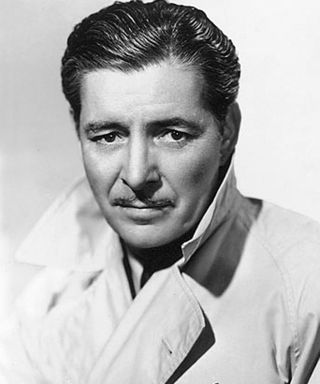
Ronald Charles Colman was an English-born actor, starting his career in theatre and silent film in his native country, then emigrating to the United States and having a highly successful Hollywood film career. He starred in silent films and successfully transitioned to sound, aided by a distinctive, pleasing voice. He was most popular during the 1920s, 1930s and 1940s. He received Oscar nominations for Bulldog Drummond (1929), Condemned (1929) and Random Harvest (1942). Colman starred in several classic films, including A Tale of Two Cities (1935), Lost Horizon (1937) and The Prisoner of Zenda (1937). He also played the starring role in the Technicolor classic Kismet (1944), with Marlene Dietrich, which was nominated for four Academy Awards. In 1947, he won an Academy Award for Best Actor and Golden Globe Award for Best Actor for the film A Double Life.
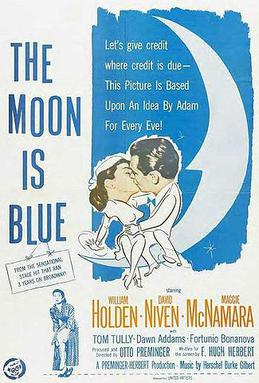
The Moon Is Blue is a 1953 American romantic comedy film produced and directed by Otto Preminger and starring William Holden, David Niven, and Maggie McNamara. Written by F. Hugh Herbert and based on his 1951 play of the same title, the film is about a young woman who meets an architect on the observation deck of the Empire State Building and quickly turns his life upside down. Herbert's play had also been a huge success in Germany, and Preminger decided to simultaneously film in English and German, using the same sets but different casts. The German-language film version is Die Jungfrau auf dem Dach.

Sommersby is a 1993 period romantic drama directed by Jon Amiel from a screenplay written by Nicholas Meyer and Sarah Kernochan, adapted from the historical account of the 16th century French peasant Martin Guerre. Based on the 1982 French film The Return of Martin Guerre, the film stars Richard Gere and Jodie Foster, with Bill Pullman, James Earl Jones, Clarice Taylor, Frankie Faison, and R. Lee Ermey in supporting roles. Set in the Reconstruction era following the American Civil War, the film depicts a farmer returning home from the war, with his wife beginning to suspect that the man is an impostor.

Kent Taylor was an American actor of film and television. Taylor appeared in more than 110 films, the bulk of them B-movies in the 1930s and 1940s, although he also had roles in more prestigious studio releases, including Merrily We Go to Hell (1932), I'm No Angel (1933), Cradle Song (1933), Death Takes a Holiday (1934), Payment on Demand (1951), and Track the Man Down (1955). He had the lead role in Half Past Midnight in 1948, among a few others.

Otto Kruger was an American actor, originally a Broadway matinee idol, who established a niche as a charming villain in films, such as Hitchcock's Saboteur. He also appeared in CBS's Perry Mason and other TV series. He was the grandnephew of South African president Paul Kruger.

Margin for Error is a 1943 American drama film directed by Otto Preminger. The screenplay by Lillie Hayward and Samuel Fuller is based on the 1939 play of the same title by Clare Boothe Luce.
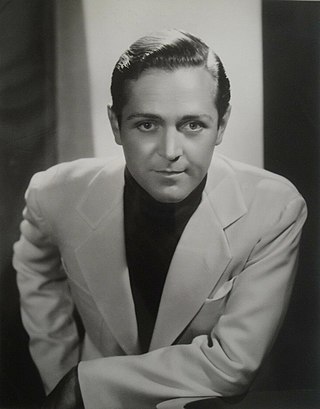
William Alexander Kirkland was a leading man in Hollywood during the early sound era as well as a stage actor who starred in productions of the Group Theatre in New York.
Libel is a 1959 British drama film starring Olivia de Havilland, Dirk Bogarde, Paul Massie, Wilfrid Hyde-White and Robert Morley. The film's screenplay was written by Anatole de Grunwald and Karl Tunberg from a 1935 play of the same name by Edward Wooll.

Walter Connolly was an American character actor who appeared in almost 50 films from 1914 to 1939. His best known film is It Happened One Night (1934).

Frank Parish Conroy was a British film and stage actor who appeared in many films, notably Grand Hotel (1932), The Little Minister (1934) and The Ox-Bow Incident (1943).
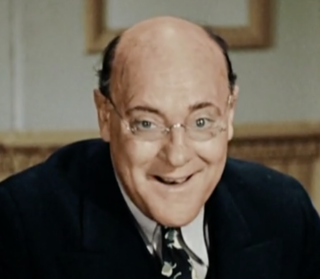
James Carmody Lankton, known professionally as James C. Morton, was an American character actor, specializing in short-tempered judges, police officers and officials. He appeared in more than 180 films between 1922 and 1942.

Eddie Gribbon was an American film actor. He appeared in more than 180 films from the 1910s to the 1950s. Gribbon began working in Mack Sennett films in 1916 and continued through the 1920s. He usually had significant roles in two-reel films, but his roles in feature films were lesser ones.
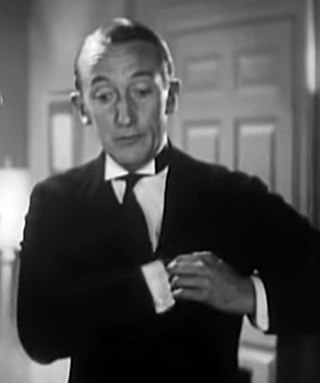
Claud Allister was an English actor with an extensive film career in both Britain and Hollywood, where he appeared in more than 70 films between 1929 and 1955.
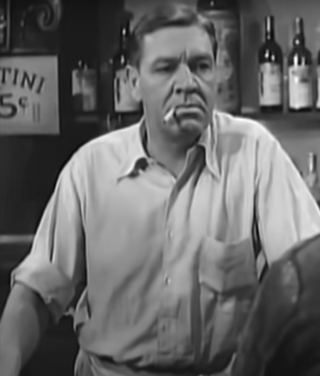
Max Wagner was a Mexican-born American film actor who specialized in playing small parts such as thugs, gangsters, sailors, henchmen, bodyguards, cab drivers and moving men, appearing more than 400 films in his career, most without receiving screen credit. In 1927, he was a leading witness in the well-publicized manslaughter trials of actor Paul Kelly and actress/screenwriter Dorothy Mackaye.

Frederick Hugh Herbert was a playwright, screenwriter, novelist, short story writer, and infrequent film director.
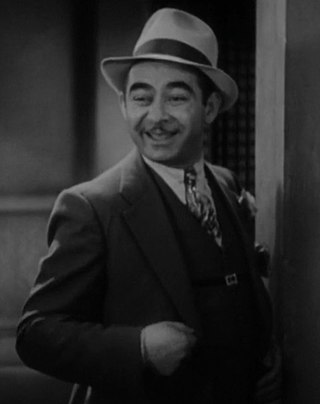
Maurice Black was an American character actor known for his portrayal of mobsters. He appeared in more than 100 films from 1928 to 1938, when he died of pneumonia, four days after his 47th birthday. He was married to Edythe Raynore.

Joan Marion Nicholls, known professionally as Joan Marion, was an Australian-born stage, film and television actress. Her family moved to Britain when she was three, and at eighteen she attended the Royal Academy of Dramatic Art (RADA), where she adopted the name Joan Marion. Subsequently, a busy stage star, she made the record books in 1934, when she appeared in two West End shows simultaneously, Men in White with Ralph Richardson and Without Witness. She also famously turned down Jack Warner and a Hollywood career, describing him as "a horrid little man." Marion continued in the theatre and British films until her marriage to wine expert Louis Everette de Rouet. With the birth of her daughter she spent many years travelling the world with her family.
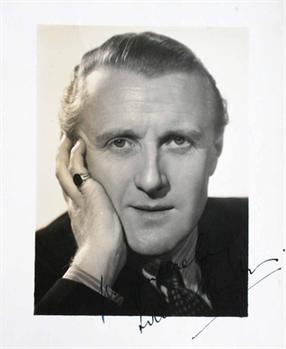
Ivan Samson was a British stage, film and television actor. Samson appeared regularly in West End plays and from 1920 began appearing in British silent films. He played Viscount de Mornay in I Will Repay and Lord Dudley in The Loves of Mary, Queen of Scots. In later talkie films, Samson played roles in the literary adaptations The Winslow Boy (1948) and The Browning Version (1951). His final film appearance was as Admiral Loddon in the 1959 film Libel. He also appeared in television series such as The Teckman Biography, Operation Diplomat and Dixon of Dock Green.
Edward Wooll, OBE, QC was a British barrister, playwright, and novelist.


















